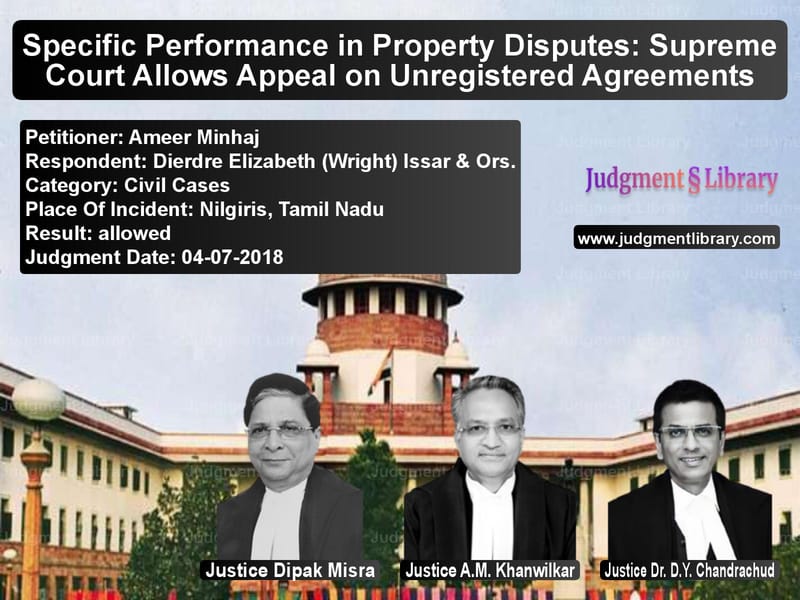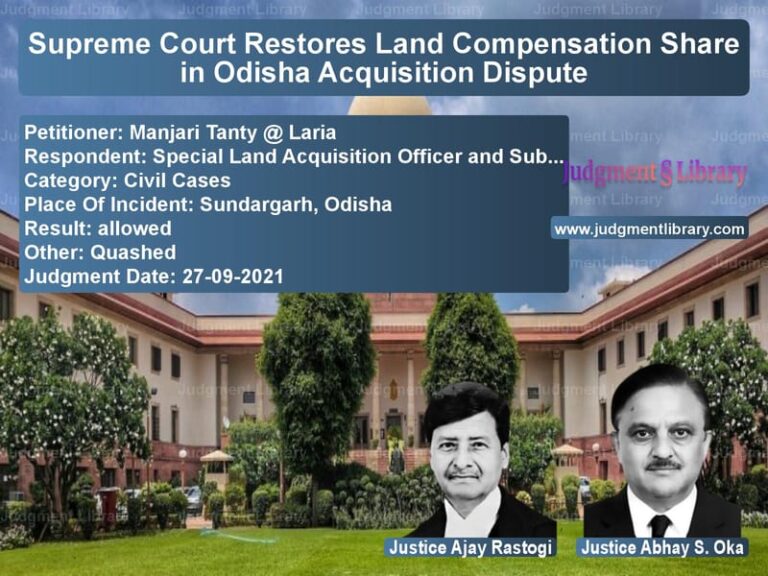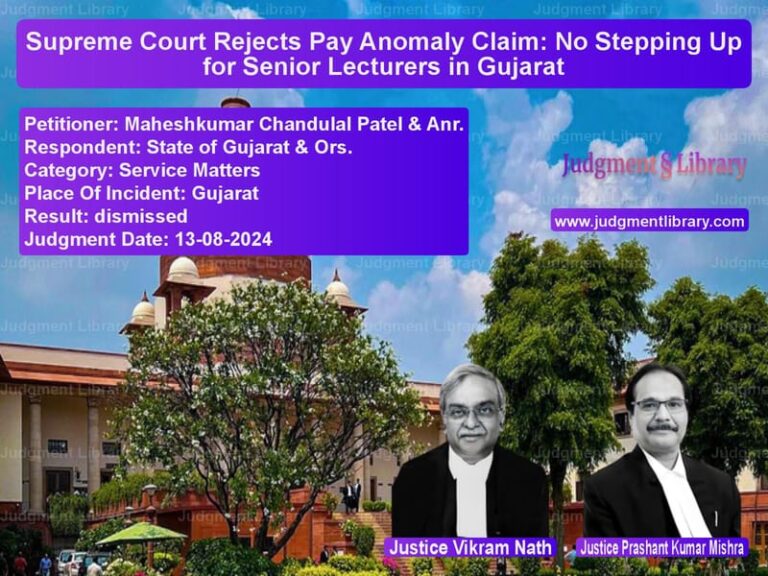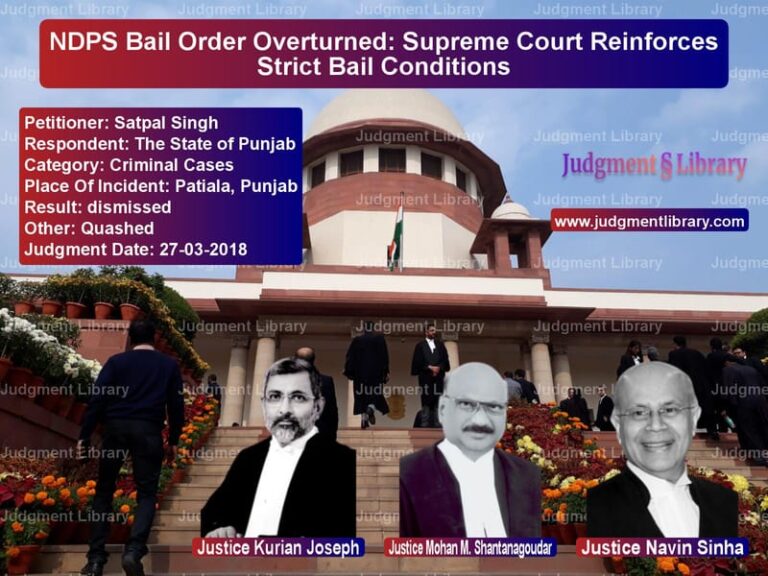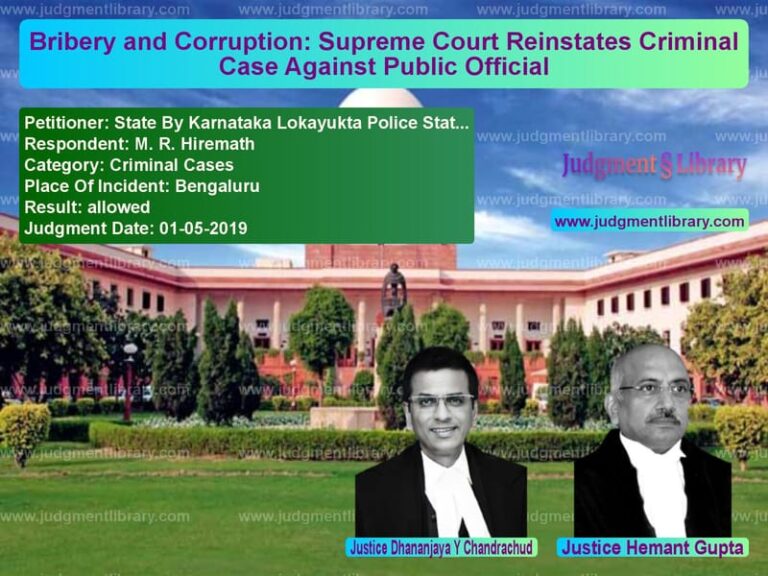Specific Performance in Property Disputes: Supreme Court Allows Appeal on Unregistered Agreements
The case of Ameer Minhaj vs. Dierdre Elizabeth (Wright) Issar & Ors. is a landmark ruling concerning the enforceability of unregistered agreements in property disputes. The Supreme Court had to determine whether an unregistered agreement to sell could be admitted as evidence in a suit for specific performance.
Background of the Case
The appellant, Ameer Minhaj, filed a suit before the District Judge of Nilgiris at Udhagamandalam in 2010, seeking specific performance of a contract, an alternative relief of refund of the advance amount, and a permanent injunction. The dispute arose over a property measuring 4.80 acres located in Coonoor Rural Village.
The appellant claimed that the original owner, Mr. Charles Thomas Orme Alford Wright (who passed away during the proceedings), had entered into an agreement to sell the property in 1995 to the second defendant, who later entered into a subsequent agreement with the appellant in 2003. The appellant alleged that he was put in possession of the property as per these agreements.
The respondents, heirs of the deceased owner, challenged the suit on the grounds that the agreements were not registered and that a power of attorney relied upon by the appellant had been revoked in 2002. The trial court admitted the documents as evidence, but the High Court reversed this decision, ruling that the agreements were inadmissible.
Legal Issues Raised
1. Can an Unregistered Agreement to Sell Be Used as Evidence?
Does an unregistered agreement for the sale of property qualify as admissible evidence in a suit for specific performance?
2. Effect of Non-Registration Under Section 17(1A) of the Registration Act
Does Section 17(1A) of the Registration Act, 1908, bar an unregistered agreement from being considered for part performance of a contract?
3. Validity of Power of Attorney
Was the power of attorney, used to execute the 2003 sale agreement, legally effective given that it had been allegedly revoked in 2002?
Arguments by the Parties
Arguments by the Appellant (Ameer Minhaj)
- The agreements, though unregistered, were valid contracts and should be admissible as evidence under the proviso to Section 49 of the Registration Act.
- The trial court was correct in admitting the documents, as they were necessary to establish the contract’s existence.
- The power of attorney was duly executed and had not been properly revoked.
Arguments by the Respondents (Heirs of Charles Wright)
- The agreements were required to be registered under Section 17(1A) of the Registration Act, and since they were not, they could not be used in evidence.
- The power of attorney had been revoked in 2002, making the 2003 sale agreement void.
- The High Court correctly ruled that the agreements were inadmissible and should not have been considered by the trial court.
Supreme Court’s Observations
1. Admissibility of Unregistered Sale Agreements
The Supreme Court ruled that unregistered sale agreements can be admitted as evidence in a suit for specific performance. The judgment stated:
“When an unregistered sale deed is tendered in evidence, not as evidence of a completed sale, but as proof of an oral agreement of sale, the deed can be received as evidence making an endorsement that it is received only as evidence of an oral agreement of sale under the proviso to Section 49 of the Registration Act.”
2. Interpretation of Section 17(1A) of the Registration Act
The Court clarified that the provision requiring registration applied only when an agreement was being used to claim protection under Section 53A of the Transfer of Property Act. However, an unregistered agreement could still be used as evidence in a suit for specific performance.
3. Power of Attorney and Its Revocation
The Supreme Court found that the power of attorney, having been executed and registered, had presumptive legal validity. It directed that the issue of whether the revocation was valid should be examined in detail during the trial.
Final Judgment
The Supreme Court allowed the appeal and ruled:
- The trial court’s decision to admit the agreements as evidence was correct.
- The High Court erred in barring the agreements from being used as evidence.
- The matter should proceed to trial for adjudication on the merits.
- The trial court was directed to conclude the proceedings within six months.
Implications of the Judgment
This ruling has significant implications for property transactions and contract law:
- Clarifies Admissibility of Unregistered Documents: Ensures that unregistered agreements can still be used in evidence for specific performance claims.
- Limits the Scope of Section 17(1A): Affirms that non-registration only prevents the agreement from being used for part performance claims, not specific performance.
- Strengthens Protection for Buyers: Prevents technicalities from being used to nullify valid property transactions.
- Encourages Registration While Protecting Agreements: While promoting registration, the ruling prevents undue hardship for parties who failed to register agreements.
Conclusion
The case of Ameer Minhaj vs. Dierdre Elizabeth (Wright) Issar & Ors. underscores the Supreme Court’s commitment to ensuring fairness in property disputes. By allowing the use of unregistered agreements as evidence, the Court has upheld the principles of justice and contractual integrity. This ruling serves as an important precedent for future cases involving unregistered property agreements.
Petitioner Name: Ameer Minhaj.Respondent Name: Dierdre Elizabeth (Wright) Issar & Ors..Judgment By: Justice Dipak Misra, Justice A.M. Khanwilkar, Justice Dr. D.Y. Chandrachud.Place Of Incident: Nilgiris, Tamil Nadu.Judgment Date: 04-07-2018.
Don’t miss out on the full details! Download the complete judgment in PDF format below and gain valuable insights instantly!
Download Judgment: Ameer Minhaj vs Dierdre Elizabeth (W Supreme Court of India Judgment Dated 04-07-2018.pdf
Direct Downlaod Judgment: Direct downlaod this Judgment
See all petitions in Contract Disputes
See all petitions in Property Disputes
See all petitions in Specific Performance
See all petitions in Judgment by Dipak Misra
See all petitions in Judgment by A M Khanwilkar
See all petitions in Judgment by Dhananjaya Y Chandrachud
See all petitions in allowed
See all petitions in supreme court of India judgments July 2018
See all petitions in 2018 judgments
See all posts in Civil Cases Category
See all allowed petitions in Civil Cases Category
See all Dismissed petitions in Civil Cases Category
See all partially allowed petitions in Civil Cases Category

